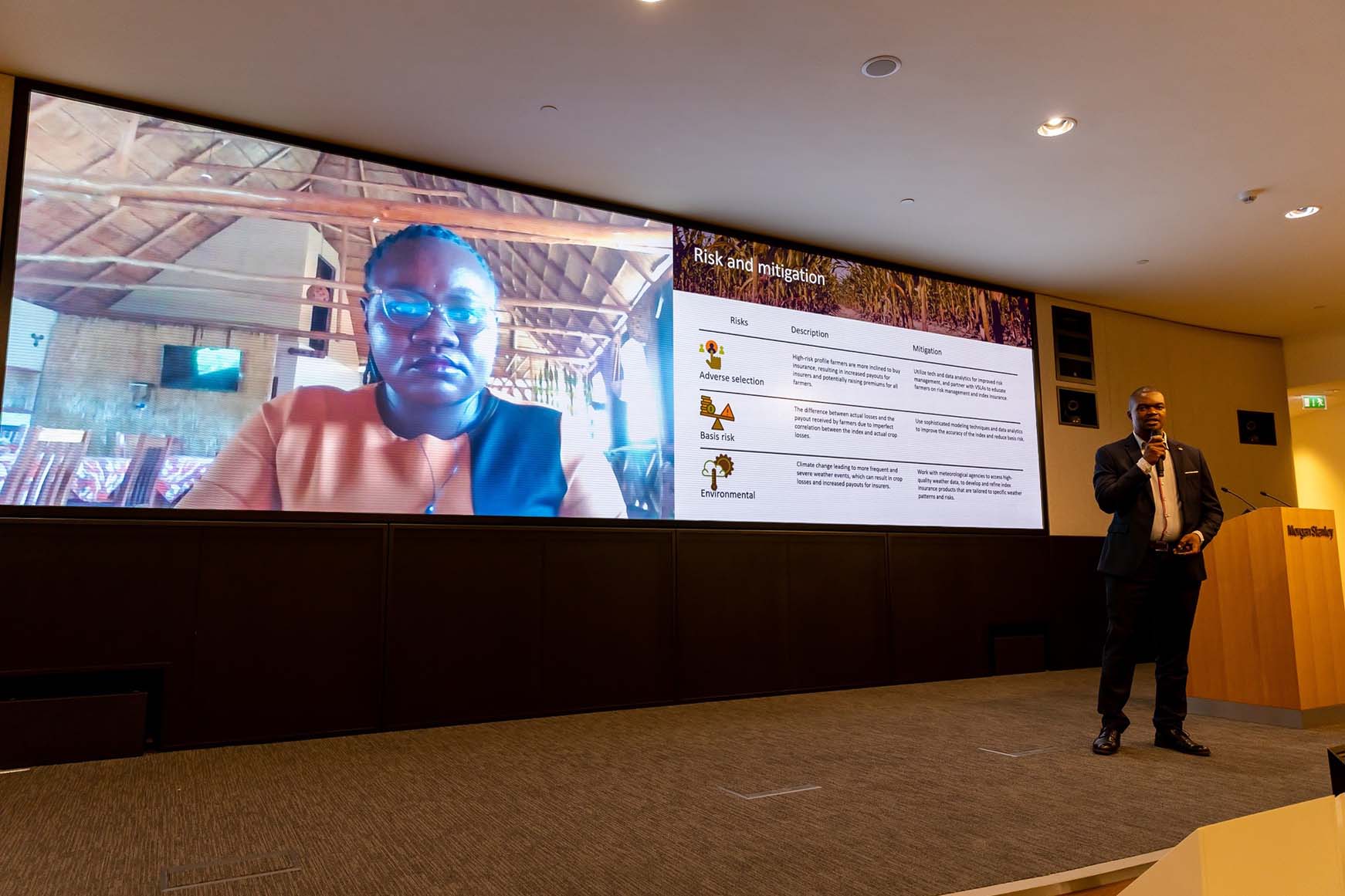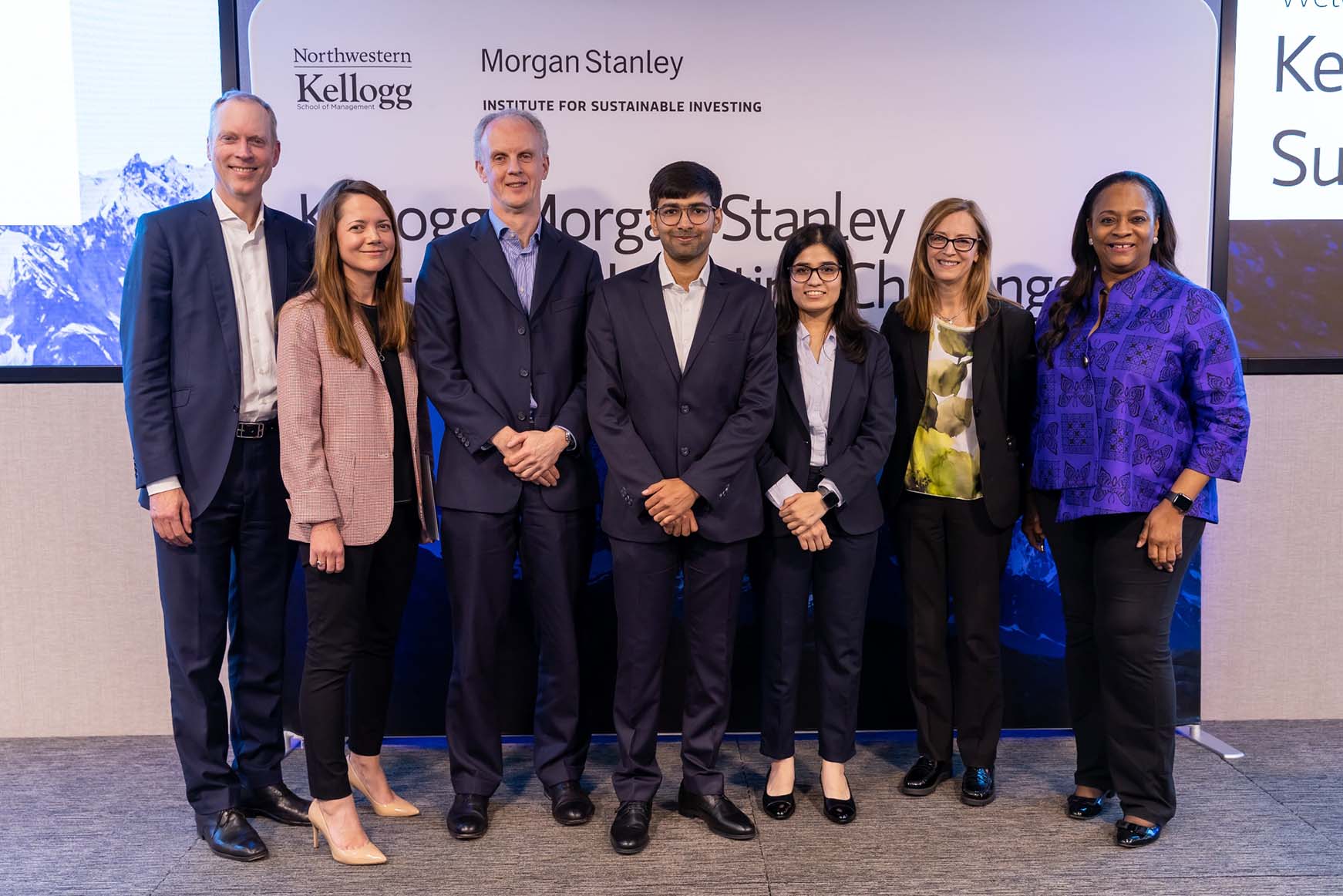Students from Gulu University in Uganda won the 2023 Kellogg-Morgan Stanley Sustainable Investing Challenge with their idea to underwrite crops vulnerable to climate change.
After a daylong competition in London, judges at this year’s Sustainable Investing Challenge awarded first place to students at Gulu University Faculty of Agriculture and Environment in Uganda for their plan to create an insurance instrument that would underwrite crops vulnerable to climate change. A team from the Delhi School of Economics came in close second with their plan to finance community-level biogas plants to reduce environmental harm associated with stubble burning.
Now in its 13th year, the 2023 Kellogg-Morgan Stanley Sustainable Investing Challenge brought dozens of emerging sustainability leaders from universities around the world to the Morgan Stanley London headquarters. Their ideas about how capital markets can address social or environmental challenges provide a glimpse of how future leaders are thinking about tackling these issues.
Students who advanced to the semifinal round of the competition pitched a wide variety of ideas, illustrating the breadth of sustainable investing possibilities. They proposed financing tools that address issues including the vaccination gap in Sub-Saharan Africa, water scarcity in the U.S. Colorado River Basin and fast-fashion supply chain sustainability in Vietnam.
“This year’s teams showed us that the world’s environmental and social challenges are deeply interconnected, and to solve them we need new and innovative ideas,” says Jessica Alsford, Morgan Stanley’s Chief Sustainability Officer and CEO of the Institute for Sustainable Investing. “As these emerging sustainable finance leaders from around the world demonstrated, it’s time we fully harness the power of the markets to prioritize sustainable and equitable solutions.”
Village Savings and Agriculture Insurance Named the Winner
The Gulu team—Nathan Emuron, Lilian Kisebe and Silver Tumwa—impressed the judges with their Village Savings and Agriculture Insurance (VSAI) proposal. Addressing the impact of climate change on Ugandan farming, the trio proposed an insurance instrument that would underwrite vulnerable crops and keep afloat smallholder farmers who may have been previously considered too high-risk to insure. Their proposal draws on the strength and partnership of local village savings and loan agencies, making the insurance coverage affordable while also promoting financial stability and sustainable economic growth in rural Ugandan communities. They secured a $10,000 award to help implement their plan.

Parv Maheshwari and Aarohi Sharma, the Delhi team, won the runner-up prize of $5,000 with their Sustainable Stubble Fund idea. Their proposal aims to reduce air pollution and land degradation associated with stubble burning, or the practice of intentionally setting fire to plant remains after rice or wheat are harvested. Their plan would finance community-level compressed biogas facilities that would accept the crop residues. This provides a more sustainable way of disposing stubble, ultimately creating a more circular rural economy.

Snapshot of the Global Competition
This year’s Challenge was one of the more competitive, with 95 teams submitting ideas targeting problems in 27 countries around the world. Volunteers in the sustainable investing community helped narrow the field of submissions to 12 teams, who were then invited to pitch in person in London in front of a panel of sustainable finance experts and senior practitioners across the industry. Only three teams were selected to advance to the final round, pitching to the judges and an audience tuning in virtually from around the world.
“For the past 13 years, we’ve continued to be impressed by how these students bring different ways of looking at and addressing our longstanding sustainability and societal problems,” said Dave Chen, Professor of Finance at Kellogg Management School, CEO of Equilibrium Capital and the founder of the Sustainable Investing Challenge. “Their leadership and energy are part of the mix we need to bring scalable capital solutions to our climate and sustainability challenges.”
The additional 10 teams who participated in the semifinals included:
Afrovax REIT
- Proposal: Afrovax REIT would raise sustainability-linked capital to invest in cold-storage facilities in Sub-Saharan Africa, which would dedicate space to vaccine storage to close the “last-mile” vaccination gap.
- School: Judge Business School, University of Cambridge
Auaca Fund: Deforestation Prevention and Sustainable Farming through Debt-for-Nature Swaps
- Proposal: Focused on the Brazilian Amazon and the global impact of deforestation and biodiversity loss, the Auaca team proposed redirecting coupon payments on Brazil’s sovereign debt to fund conservation and the promotion of sustainable farming practices.
- School: University College London
Blockchain-Enabled Variable Rate Water Credit Offset Bonds
- Proposal: This proposal would address water scarcity in the Colorado River Basin and other water crisis areas through water offset credits, leveraging a BlueCert bond and blockchain contracting.
- School: Haas School of Business, University of California, Berkeley
FuelForward Fund
- Proposal: FuelForward is a private equity fund that would address sustainable air fuel (SAF) supply issues by acquiring increasingly unprofitable European oil refineries and retrofitting them for SAF production.
- School: IESE Business School, University of Navarra
Green Future Reclamation Fund
- Proposal: Recognizing a market gap in financing the reclamation of mining sites in Indonesia, the proposal would use a combination of bonds and carbon credits to facilitate mining companies’ mandated remediation and reclamation activities.
- School: TIAS School for Business and Society
HIV Fighter Fund
- Proposal: HIV Fighter Fund is a special-purpose vehicle that would incentivize joint ventures between global pharmaceutical companies and PEPFAR-contracted manufacturers in Sub-Saharan Africa to induce the development of resilient and efficient local supply chains.
- School: Kellogg School of Management, Northwestern University
Kelp Klique Sustainability-Linked Fund
- Proposal: Kelp Klique would purchase capital-intensive harvesting equipment and lease it to kelp farmers to help them sustainably scale and contribute to ocean de-acidification and biodiversity preservation.
- School: Schulich School of Business, York University
Saarthi
- Proposal: Saarthi would partner with community organizations and employers to provide social services, job training and loans to victims of domestic violence in India in exchange for a share of future income.
- School: University of Connecticut, Yale School of Management, Yale University
Soilsurance
- Proposal: Soilsurance would serve as an alternative to U.S. federal crop insurance, accounting for the risk-mitigation benefits of improved soil health. Farmers would earn a discount on their premiums based on soil-building practices, while improved farm resilience would reduce payouts.
- School: Columbia Business School, Columbia University
Sustainable Runway Fund
- Proposal: Sustainable Runway Fund is a special-purpose vehicle that would make investments in Ioncell manufacturing capacity in Vietnam to improve the sustainability of the fast-fashion supply chain.
- School: Questrom School of Business, Boston University



